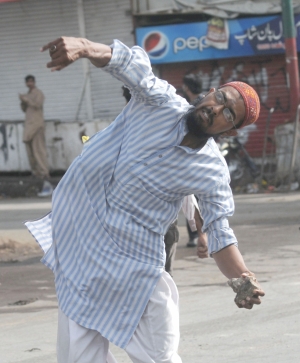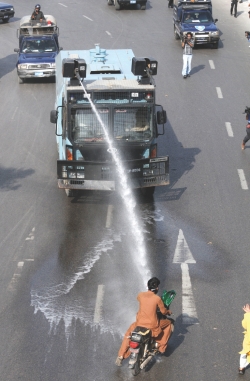| Home - Back Issues - The Team - Contact Us |
 |
| Volume 10 |Issue 38 | October 07, 2011 | |
|
|
Perceptions Visiting
Violence Farida Shaikh Last week, August 14, I was visiting my home city, Karachi, the city of my school, and university days. Instead, I found that I was visiting violence; Karachi… Karachi was burning… like a giant cauldron all ablaze!
There was utter confusion and chaos. On August 19, 2011, 27 people died on the streets and alleys of this metropolitan city. In Orangi Town bazaar bullet ridden unidentified bodies were found. In the same area ambulance driver and helper of Khidmat-i-Khaleq were injured. On the same day hand grenades injured a woman in Usmanabad Garden Area. In Macher colony, dock police area, another unidentified tortured body of a man was found. Yet another tortured dead body was found near L-5 bus stop, Mochko police limits. Nearby a young man about 35 years old, was shot dead. By the end of the week on 24 August, there were about 101 people dead in this burning city of Karachi, according to media report. Karachi's poor are unemployed inhabitants living in the Lyari area where 'Abject poverty drives the young amongst them to drug and crime… it is this section of the Lyari who are being exploited, armed and instigated.' This was the viewpoint of a former federal secretary. This is also connected with the administration of the dismantled city government within the three ordinances passed by the Sindh Assembly. The most obvious questions being raised are: 'Was Karachi not relatively peaceful when the city government was functional? Was Karachi not witnessing progress and development when the city government was in place? Why then tamper with or undo a system that was working reasonably well?' It is now over two decades that large-scale ethnic violence first occurred in this city. Over the years the politicians have re-charged the ethnic energy for conflict. Initially the target of killing at first sight was a political rival. Then it was indiscriminate killing of innocent people who have nothing to do with politics— daily wage workers, small traders and associates of the business community. Now ethnic groups target one another and the politicians watch and 'remote control' the killing and confusion. The numbers killed are more and more each day. Karachi is a city on the 'brink of an ethnic civil war.' Every political party is involved in this madness. The politicians are fighting a turf war. Their men are armed with the most sophisticated weapons. It is a bloody power play that has the politicians in various major and minor roles. Sometimes they are like 'warlords' and depend on goons to do their nefarious activities. Some politicians are sometimes enlisted as criminals; however none have ever been summoned by the court. The criminal activities continue uninterrupted. Quite an emphatic opinion is held on the subject of the 18th Amendment, 4 May 2010, of the Pakistan Constitution. Though this was directed at empowerment of the provincial government, it has largely become a clever device of power sharing between the provincial and federal government. Secret proceedings surrounded this amendment. The committee members hardly had any discussion on the matter with the party forums, and the common citizen know very little about the amendment and its content. There were no minutes recorded when it was passed in the parliament April 29, 2011. The speaker of the National Assembly Dr Fehmeda Mirza wanted to see the original; she was informed that the Original 1973 Constitution was not present in the record of the Assembly. The implementation of this process now is a pathetic story; the less heard about it the better!
The debate that is raging in the political circle is over army intervention in Karachi. Will military mediation arrest the deadly violence? And will normalcy— law and order for the ordinary citizens make a return? As rangers and Sindh police have totally failed to arrest the spread of violence, some fear the huge loss of human lives and the situation turning towards a point of no return. On August 20, Chief of Army Staff General Kayani said, 'The army is ready to restore peace in Karachi if asked by the government.' The government situation is between the devil and the deep blue sea. The army intervention to save the situation is very much expected to be supported by en mass population of the city. However if the army is invited, it then clearly demonstrates government failure. The electronic media is engaged in presenting a panorama of live programmes on current affairs by thinkers and analysts. Opinion and views are exchanged and explained leading to no solution to the situation. Asma Jahangir, president of the Supreme Court of Pakistan said that most of the political parties have transformed into 'Bhatta Committees' to collect extortion money by terrorising the people of Karachi. The government is just forming committees and not coming up with solutions. Human rights activists at the Aurat Foundation to be joined by others had planned to go on hunger strikes from September 12 to demand an end to corruption and a cut in the military budget of the country. Pakistan Tehrik-e-Insaf has planned to launch an anti-government agitation, stage sit-in and a long march towards Islamabad. The law and order situation in Karachi and Paktunkhwa are similar. On August 19, nearly 48 people were killed and 110 injured when a teenage suicide bomber blew himself up in the Madokhel village mosque, Ghundi in Jamrud, where long ago, the Pakistan military staged ‘Target Bombing Demonstrations for the visiting Shah of Iran. The bombing was to avenge the militants, Tehrik-i-Taliban Pakistan who are fighting to gain hold of their territory in the Tirah valley of Khyber Agency. The Supreme Court does not have jurisdiction over the tribal areas and persons from this area cannot appeal to any court in Pakistan and persons living in Federally Administered Tribal Areas are not accepted as Pakistanis. The military is heavily engaged in the tribal areas of Pakistan, fighting terrorism. Since 9/11, from the beginning of 2002 to 2010, Pakistan received $18 billion in economic aid. Much of the military aid, around 70 percent was misspent, according to western military experts. Situating Karachi under army control would drastically curtail Karachi, the hub of economic and financial activities of Pakistan. Karachi produces $40 billion worth of goods and services a year. This is more than what Lebanon, Tanzania or Uzbekistan produce over the same period. In addition to this, nearly $60 billion worth of goods are traded through the Karachi port. There is no strong resolve on the part of the government to deal with the present political eruption. Reference to past experiences show that it is extremely problematic to call in the army, as that would automatically be the signal for departure of the civilian rule in the country. Simultaneously it would also hold the eminent politicians responsible for this orchestrated situation. And like in the past, it would spell the annihilation of the democratic process with resounding echoes from M Asgar Khan, “We've Learnt Nothing from History: Pakistan-Politics and Military Power,” (2005, Oxford University Press, Karachi)
Copyright
(R) thedailystar.net 2011 |
||||

